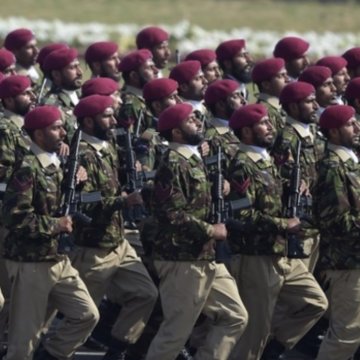- About
- Topics
- Picks
- Audio
- Story
- In-Depth
- Opinion
- News
- Donate
- Signup for our newsletterOur Editors' Best Picks.Send
Read, Debate: Engage.
The dominant military establishment in Pakistan has practically been at the helm of affairs throughout its history. Whenever a civilian government or a leader wished to steer things away from Rawalpindi, the garrison city, home to the Pakistan Army’s General Headquarters GHQ, it has faced opposition in all possible ways.
Now, with parliamentary elections in sight, the establishment seems to have embarked on mission to engineer the outcome through pressure tactics as well as veiled and barefaced manoeuvres.
Last month, the country’s top private news channel Geo News was shut down. First in the military’s cantonment residential areas across the country as well as other residential neighbourhoods that are administered by the military. Later, this month, all Geo channels – including news, entertainment and sports channels – were blocked across the country by cable operators. The network’s channel assignment on the cable distribution network has also been lowered.
In the eyes of many observers, the army’s main foe – the former Prime Minister Nawaz Sharif – is still believed to have a significant following among the masses, something the army wants to curtail before the polls. The military has directly ruled Pakistan for almost half the country's history, since independence 70 years ago and most recently overthrowing a previous Sharif government in a 1999 coup.
The parent company behind Geo News – the Jang Group of Newspapers, was also facing the heat for what many observers believed was its bold stance against the GHQ's handling of the political situation. Some of the leading columnist in the country who have also expressed their opinion on the Pashtun Tahafuz Movement (PTM) – run by the ethnic minority against alleged state-oppression in the tribal areas near Afghanistan – have also been silenced with similar pressure-tactics.
Pakistani Army Chief, Gen. Qamar Javed Bajw, is on record saying such "engineered protests" will not be allowed. On record, the army remains silent on its plans to subdue Geo News before allowing it back on air, but in the PTM’s case, Gen. Bajwa’s words clearly demonstrated the power of jurisdiction by the army in civilian and political affairs.
These moves might earn the Pakistani army an upper hand for short-term goals in the near future, but they would certainly harm the sustainable and democratic future for millions of Pakistanis.
